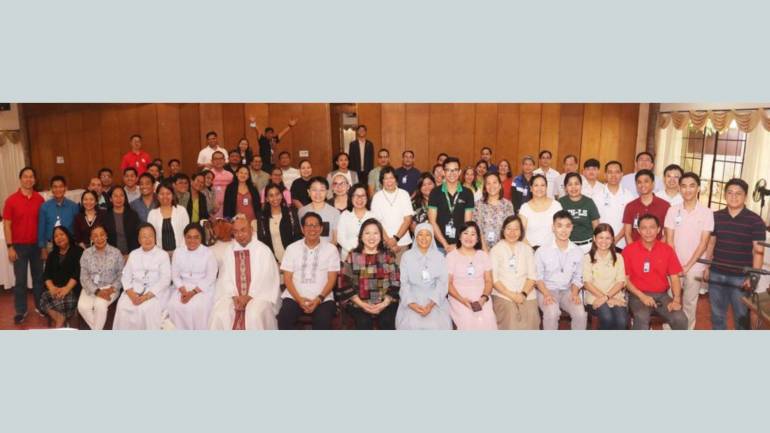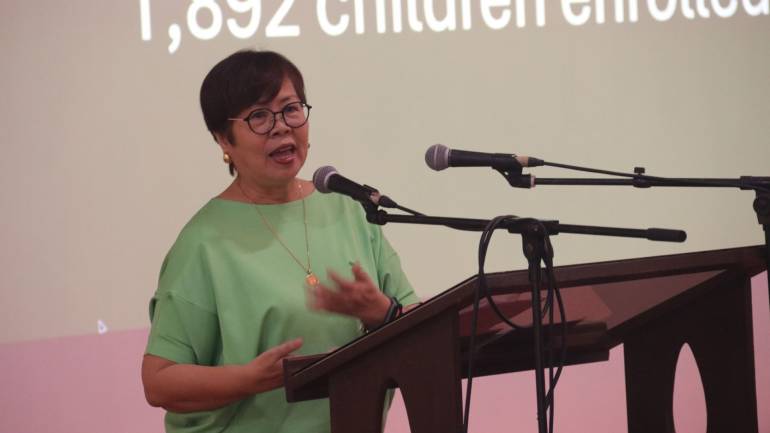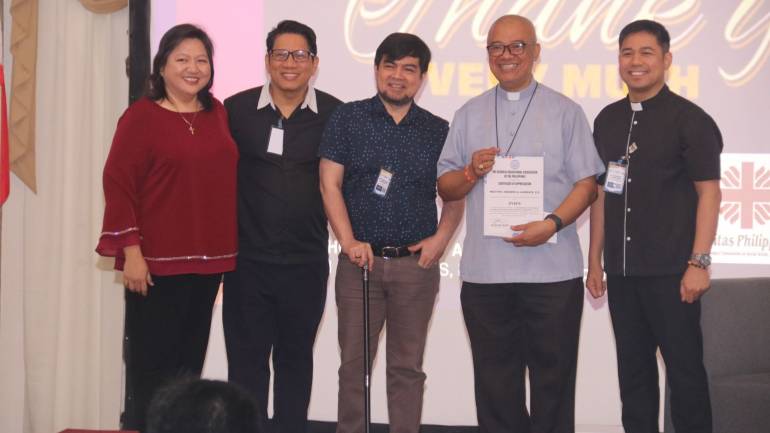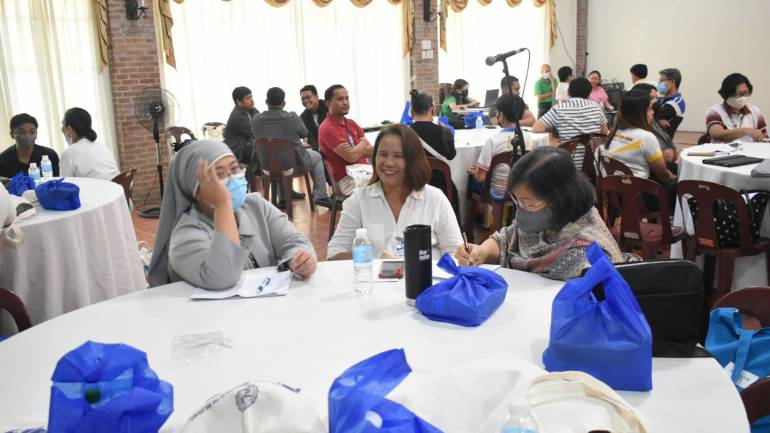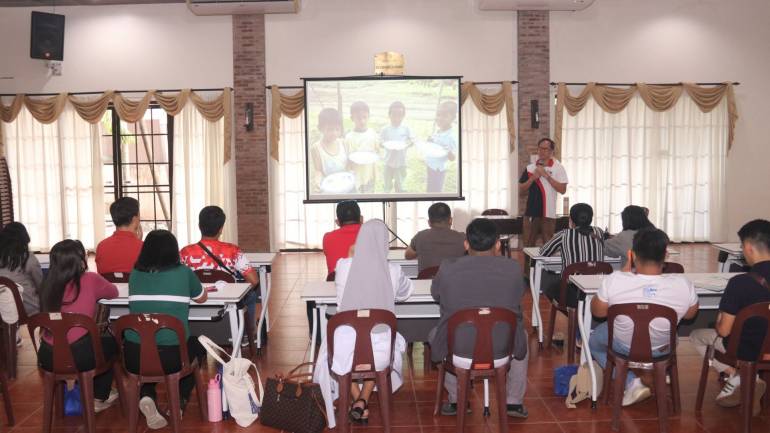Catholic schools find ways to address inequality, poverty in Philippines
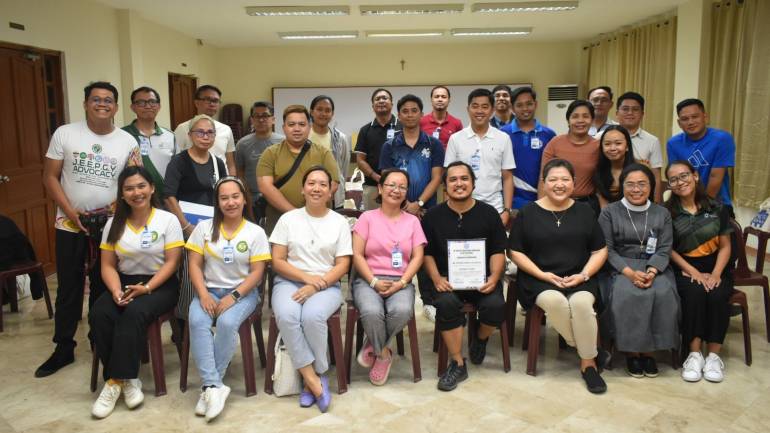
The Catholic Educational Association of the Philippines (CEAP)-JEEPGY—Justice and Peace, Ecological Integrity, Engaged Citizenship, Poverty Alleviation, Gender Sensitivity, and Youth Empowerment (JEEPGY) Conference in 2024 in Bacolod City drew over 70 delegates from educational institutions around the country to discuss how to apply the synodal model—which Pope Francis has endorsed—to combat economic injustice and poverty.
This year, the conference provided academic institutions with a useful tool for comprehending the root causes of inequality and poverty and devising creative strategies to solve these problems.
The University of St. La Salle-Bacolod hosted the event, organized in collaboration with the Private Education Assistance Committee (PEAC), on April 10–12.
Bishop Gerardo Alminaza of San Carlos officiated a Eucharistic celebration to kick off the conference. Fr. Mauricio T. Ulep, CMF, vice president of CEAP and chair of the programs committee, gave the homily.
Fr. Ulep urged the audience to contemplate the societal frameworks that enable the epidemic of poverty-related deaths and to embrace the discomfort they cause.
Jose Allan I. Arellano, Executive Director of CEAP, read the inauguration speech on behalf of Fr. Albert N. Delvo, the organization's president. Before this, Br. Joaquin Severino S. Martinez, FSC, president of the University of St. La Salle, made some motivational remarks.
He also gave a synopsis of the meeting. Arellano assured everyone in his summary that the conference will provide a chance to put synodal ideals into practice, despite the depressing reality of poverty in our nation. Furthermore, the COVID-19 pandemic has made poverty in the nation worse by forcing a great number of Filipinos into poverty and prohibiting them from accessing necessities.
Bishop Alminaza reiterated Arellano's ideas in his keynote speech, revealing his experiences and expressing his hope that this year's conference will provide helpful solutions.
According to him, any change must originate from a "pastoral cycle" that comprises observing our surroundings, assessing our feelings, drawing conclusions, and then acting on those conclusions.
“The cycle should also help us define our identities as individuals and communities. Everything we do has an impact on other people. Since social events eventually affect us, this fact should force us to consider the needs of others. To build communities and effect real change, church synodality depends on listening to others and shifting the emphasis from 'I' to 'we,'" he said.
Alminaza also covered a lot of ground in his speech about the numerous issues that modern-day Philippine society is facing, particularly those that the COVID-19 pandemic has made worse: poverty, starvation, economic crises, and youth development.
He contends that for leaders to perceive and comprehend the needs of people, a synodal approach is required.
Leaders can serve more effectively and humanely when they take on the viewpoint of those who are less privileged.
His diocese in San Carlos, together with community projects in Negros, served as examples of stewardship and charity endeavors, encouraging the attendees to consider creative plans, methods, and routines informed by synodal ideals.
Three panelists who collaborate with local anti-poverty organizations talked about their individual experiences.
Ms. Joy Jarabelo, the first panelist, discussed the programs that her province's Federation of Urban Poor People's Organization, Negros, Inc. (FED-UP), is carrying out to assist the urban poor.
Ms. Coleen Awit of the Center for Energy, Ecology, and Development (CEED) spoke about poverty from the perspective of shared and limited resources. Ms. Liberty Adorias-Alarcon, the final panelist, discussed the initiatives the local government is implementing to enhance people's lives through the Technology and Livelihood Development Center (TLDC).
Early on the second day, the conference split the attendees into five groups and took them on an exposure tour to five different locations.
The first of these five organizations is Sagup Negros, Inc. Three organizations: Negros Women for Tomorrow Foundation (Dungganon); 4) USLS Bahay Pag-asa Youth Center; 5) Negros Occidental's Technology and Livelihood Development Center (TLDC); and 5) Negrense Volunteers for Change (NVC) Foundation, Inc. Each group gave a presentation to the guests outlining its goals, ongoing projects, and issues it wants to tackle.
In the afternoon, Ms. Krystel Marie Santiago from the Diocese of Bacolod Projects Office led a spiritual discussion.
Participants were able to share what they had observed and learned from the various groups, in addition to hearing from the Spirit. Following the sharing, Ms. Krystel Marie Santiago questioned the attendees about why they thought it was important to address problems like poverty and injustice.
The final half of the day involved splitting the participants into four groups, each of which focused on a different JEEPGY pillar.
The four sessions discussed ecological integrity, justice and peace, engaged citizenship, youth empowerment, and gender equality. Dr. Loreta Navarro Castro, head of the CEAP Justice and Peace Subcommittee, introduced Fr. Cris Gonzales, from the Pastoral Office of the Diocese of Bacolod, as the resource person for the first concurrent session.
Mr. Chris Fadriga, president and farmer of Plantation de Sikwate, and Rafael L. Coscolluela of Energy and Environment Concerns were named as ecological integrity resource persons at the conference.
Sr. Marvelous L. Misolas, MM, of the CEAP Ecological Integrity Subcommittee led the meeting. The "Citizenship and Youth Empowerment" session drew the largest number of attendees. Ms. Teodoro Angelo Villanueva, president of Youth Empowering Youth Initiative, Inc., led the session, and Ms. Mary Ann S. Cruz, deputy executive director of CEAP, served as a resource. Ms. Teresita G. Barcoma of the Balayan Social Development Center chaired the fourth session, "Gender Equality," which featured Mrs. Marie June P. Castro, the Province of Negros Occidental Action Officer. Parallel discussions aimed to draw attention to the interrelationships among all JEEPGY pillars and provide a platform for innovative discussion of JEEPGY-related issues and ideas.
The president of the Negrense Volunteers for Change (NVC) Foundation, Inc., Ms. Milagros L. Kilayko, lectured on the third day about methods for eradicating poverty. Ms. Kilayko explained how her organization will use the "Mingo Meals" initiative to combat malnutrition, a major problem in the Philippines.
She explained how the initiative provided rice and mongo beans as part of a fast-food kit that thousands of children received. With this program, the NGO gave farmers new employment opportunities while also preventing malnutrition in millions of children.
The participants had the opportunity to discuss the JEEPGY-related projects their schools were working on during a special "Coffee Conversations for Networking and Linkages" segment of the program.
At the last Eucharistic liturgy, the Diocese of Bacolod's Fr. Hubert M. Javellana, presided.
Through the innovative process of identifying the underlying causes of poverty and presenting organizational solutions, the 2024 CEAP JEEPGY Conference has made poverty more approachable in all aspects when analyzing social structures.
The 2024 CEAP JEEPGY Conference's innovative approach to networking solutions at the organizational level has resulted in a more understandable perspective on poverty from any angle that looks at societal systems.
The conference demonstrates that while institutional responses to poverty are important, true change can only occur when everyone recognizes their unique role within the system and takes action to uplift themselves and others. We achieve this by combining various ideas, practices, and strategies from various groups and individuals.
Radio Veritas Asia (RVA), a media platform of the Catholic Church, aims to share Christ. RVA started in 1969 as a continental Catholic radio station to serve Asian countries in their respective local language, thus earning the tag “the Voice of Asian Christianity.” Responding to the emerging context, RVA embraced media platforms to connect with the global Asian audience via its 21 language websites and various social media platforms.





